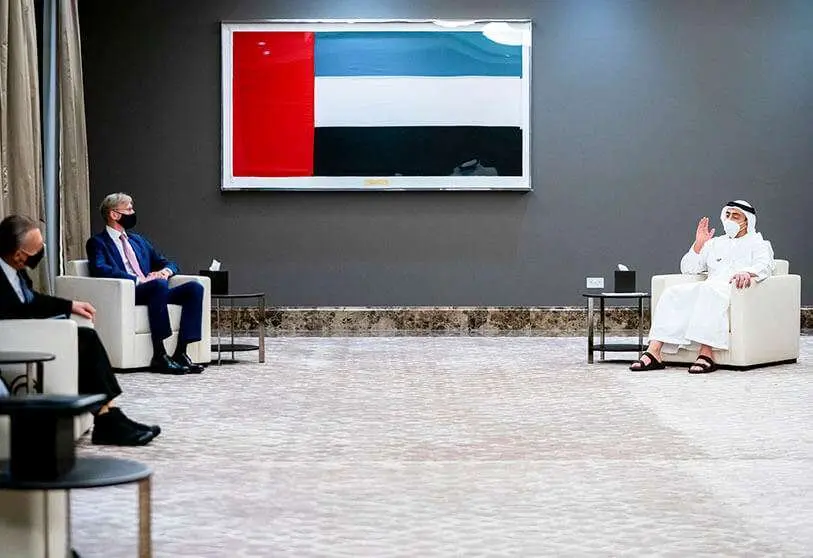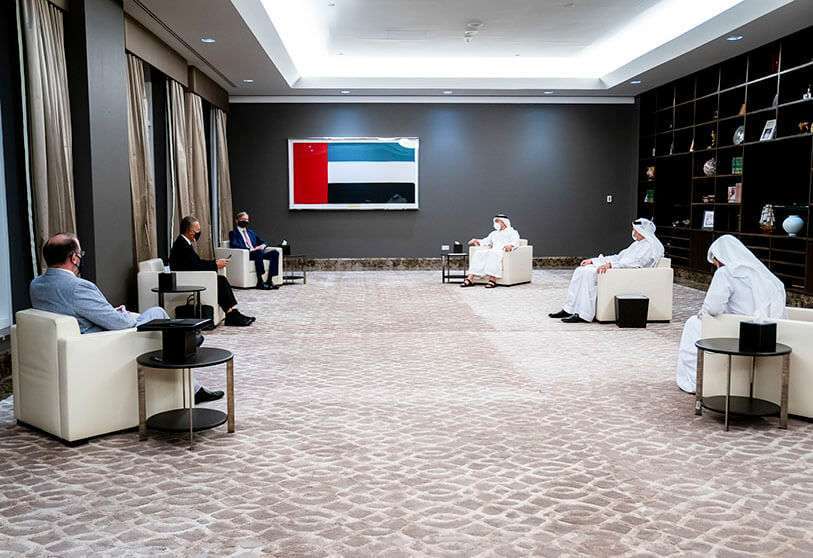UAE and US discuss growing tension with Iran

Abdullah bin Zayed al-Nahyan, foreign minister of the United Arab Emirates (UAE), and Brian Hook, U.S. special representative to Iran and political adviser to Secretary of State Mike Pompeo, met on UAE soil to review the current situation in the Middle East and to address the ongoing conflict with the Islamic Republic of Iran.
The meeting took place in a cordial way, as it could not be otherwise between two partners and allies within the group of countries of the region that are in the orbit of Saudi Arabia, totally opposed to the one represented by the regime of the Ayatollahs or Qatar. A block headed by the Kingdom and the UAE, totally supported by the American giant, a nation that develops a great deal of bilateral cooperation with the UAE at all levels.
Sheikh Abdullah bin Zayed al-Nahyan received the American diplomat at the headquarters of the Ministry of Foreign Affairs and International Cooperation of the United Arab Emirates in Abu Dhabi, where they discussed the serious challenge that Iran's belligerent position continues to pose. Both personalities showed the firm objective of strengthening collaboration to work towards a more secure situation in the Middle East.
At this meeting, attended by Khaldoon Khalifa al-Mubarak, Chairman of the Abu Dhabi Executive Affairs Authority, and John Rakolta, US Ambassador to the UAE, the Arab country's Foreign Minister denounced the permanent interference of the Persian country and its partners, such as Qatar and Turkey, in the affairs of other neighbouring states. In addition, he stressed UAE's interest in deepening cooperation with the US on all fronts. He pointed out that both countries share the commitment to defeat extremism in all its forms, in order to create more tolerant and peaceful societies, as explained in an official note from the Emirate news agency WAM.
For his part, the US special representative stressed the importance of the bilateral relationship with the UAE and assured his Emirati counterpart of the continued efforts to advance in strategic cooperation.
The concern remains logical and notorious for the atmosphere that continues to breathe in the Middle East with the aggressive policy that they continue to carry out from the pole of nearby countries in their relations such as Iran, Qatar and Turkey.
The role played by the regime of the ayatollahs entering into the internal affairs of other countries through groups and militias similar to the Shiites is well known; as in the cases of Iraq, with the Popular Mobilization Forces; of Lebanon, with Hezbollah; of Syria, with the Afghan insurgents of Liwa Fatemiyoun; of Yemen, with the Hutu rebels; or of Palestine, with Hamas.
In this sense, the United States continues to maintain a historic dispute with Iran, which was strengthened as a result of the American exit in 2018 from the nuclear agreement that was signed with the Persian state in 2015 (JCPOA), along with other international actors such as France, Germany, the United Kingdom, China, Russia and the European Union (EU), which limited the Iranian atomic program, especially in terms of weapons.
The US government of Donald Trump denounced the Iranian non-compliance with the agreements and disregarded what had been agreed, imposing political and economic sanctions on Iran, among which those related to oil, its main source of financing, stood out.

The President of Iran, Hassan Rohani, responded to this movement by threatening to violate the main points of the JCPOA, especially those related to uranium enrichment and heavy water treatment, and to block the Strait of Ormuz, the main passage area for world oil trade.
As a result, there were incidents with cargo ships in the waters of the Gulf and attacks on oil and airport infrastructures in Saudi Arabia, for which Iran and pro-Iranian agents, such as the Hutus, were blamed for attacking objectives of the Saudi kingdom (a great regional rival of Iran and the maximum exponent of the Sunni branch of Islam, as opposed to the Shiite one defended by the regime of the Ayatollahs).
In spite of all this, Iran ended up receiving support from the EU through the INSTEX mechanism, by means of which medical and humanitarian material was served to the Persian country to combat the health crisis of the COVID-19 disease, thus avoiding the US blockade by means of the materialization of transactions without the use of dollars. One health problem is that of the coronavirus pandemic which the Emirates has been helping the Iranian nation with over the past few months.
One of its countries close to the Iranian sphere, Qatar, has also been suffering from a diplomatic and financial blockade since 2017, when Saudi Arabia, the United Arab Emirates, Bahrain and Egypt accused the Gulf monarchy of supporting cross-border terrorism (it is worth remembering the Qatari links with organizations such as the Muslim Brotherhood, considered a terrorist entity by several Western countries). This was a big blow to the Qatari country, which ended up looking for new partners on the international level in Turkey and Iran to revive its economy.
Recep Tayyip Erdogan's Turkey also appears as a destabilizing element in the Middle East and North Africa, especially because of its well-known military intervention in the civil wars in Libya and Syria, and even in Iraq. An attitude that seeks, on the one hand, to achieve a privileged situation in the Mediterranean arc, with economic purposes linked to gas and oil prospecting (proof of this is the agreement that the Turkish president sealed with the Prime Minister of the Libyan National Accord Government, Fayez Sarraj, at the end of last year), and, on the other hand, The government's efforts to divert attention away from the internal problems of the 'sultan' by seeking common enemies abroad, saw its Justice and Development Party (AKP) lose much electoral support in the local elections of 2019, giving municipal power to the opposition in major cities such as Istanbul, the financial capital of the Ottoman country, and Ankara, the administrative capital.








